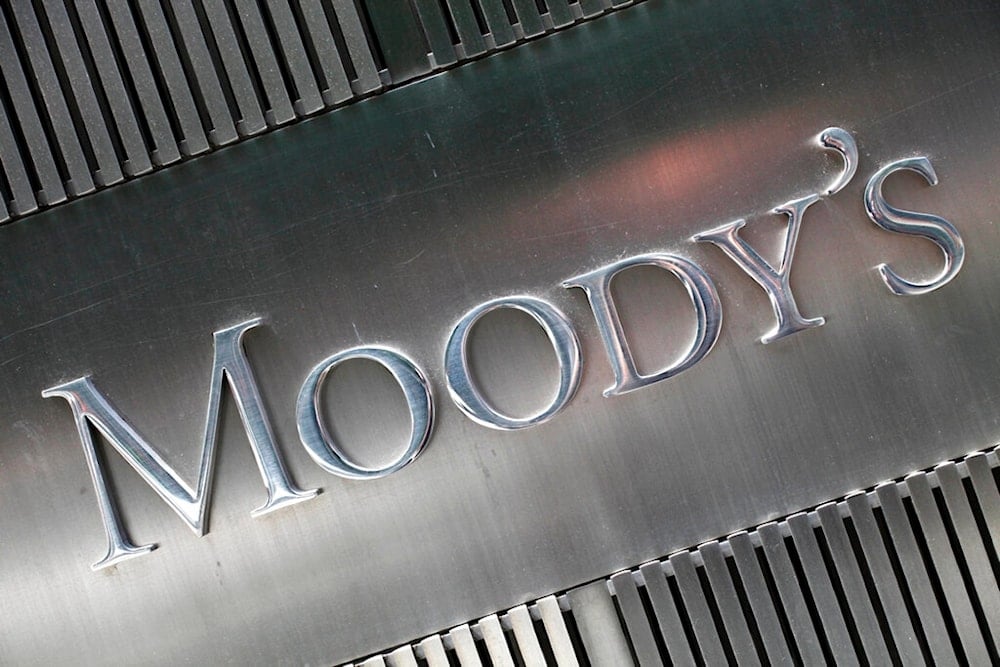Moody's warns 'Israel' ceasefire may not ease long-term risks
Moody’s cautioned that "Israel's" ceasefire with Hezbollah may provide short-term relief but has yet to demonstrate a sustainable reduction in risks.
-

This August 24, 2010 file photo, shows the signage for Moody's Corp., in New York. (AP)
Moody's Investors Service cautioned on Thursday that it is too early to assess whether "Israel's" recent ceasefire with Hezbollah will significantly and sustainably reduce the risks that prompted the agency to downgrade "Israel's" sovereign credit rating in September.
While the agreement has eased some market concerns, broader geopolitical and domestic uncertainties remain.
Mixed Reactions to Ceasefire
The ceasefire deal, reached earlier this week, has been welcomed as a step toward de-escalating tensions between "Israel" and Hezbollah. Following the announcement, Israeli bonds, which had been under pressure during the war, gained value. Lebanon's bonds also saw some improvement.
Fitch Ratings noted that the ceasefire could limit strains on "Israel's" credit profile, though it emphasized that the broader security and economic challenges remain unresolved.
Moody's echoed this sentiment, stating that while the immediate geopolitical risks appear to have eased, the situation remains fluid.
Credit Risks and Domestic Challenges
Moody's downgraded "Israel's" sovereign credit rating to Baa1 from A2 in September, citing escalating conflict in the region and concerns about long-term economic stability. On Thursday, the agency maintained its negative outlook for "Israel", warning that further downgrades remain possible.
In addition to external risks, Moody's pointed to domestic political challenges, including proposed judicial reforms and attempts to exempt ultra-Orthodox Israelis from military service, as significant factors contributing to social tensions and economic uncertainty.
"In our view, the Israeli government is pursuing policies that add to already high social tensions in the country," the agency stated, noting that these dynamics could impact investor confidence and the country's economic growth prospects.
Read more: JPMorgan slashes 'Israel's' 2024 GDP forecast to 0.5% as war rages
The ceasefire comes more than a year after the outbreak of the Gaza genocide, which sparked a wave of resistance-led operations across the region. While the truce offers a temporary reprieve, analysts are cautious about its long-term implications.
The sustainability of the agreement and its ability to prevent further conflict will likely influence "Israel's" economic and geopolitical standing in the months to come.
'Israel' violates ceasefire
The report came shortly after Israeli occupation forces (IOF) shelled several towns in southern Lebanon on Thursday, violating the ceasefire agreement, according to Al Mayadeen's correspondent. Artillery strikes targeted the towns of Khiam, Taybeh, Rub al-Thalathin, Marjaayoun, and Hilta, with civilians among the casualties.
Lebanon’s National News Agency reported that Israeli artillery shelled the outskirts of Hilta in the Hasbaya district, injuring two civilians in the town of Markaba. Both were transferred to the hospital. An Israeli tank fired two shells at Kfar Chouba, while a Merkava tank targeted the town of al-Wazzani. Israeli reconnaissance aircraft were also seen flying over villages in the Tyre and Bint Jbeil districts.
Later in the evening, the towns of Aita al-Shaab and Bint Jbeil came under Israeli shelling.
These incidents follow Wednesday's injury of two journalists by Israeli fire as they covered the return of residents and the Israeli withdrawal from Khiam. The attacks highlight ongoing tensions despite the ceasefire agreement and have raised concerns over civilian safety in the region.

 3 Min Read
3 Min Read








